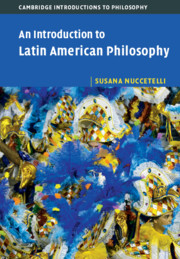Book contents
- An Introduction to Latin American Philosophy
- An Introduction to Latin American Philosophy
- Copyright page
- Dedication
- Contents
- Tables
- Preface
- 1 Setting the Scene: The Iberian Conquest
- 2 Modest and Immodest Feminism
- 3 The Authoritarian Republicanism of Bolívar
- 4 The Liberal Republicanism of Sarmiento and Alberdi
- 5 Homegrown and Imported Positivism
- 6 Martí’s Liberal Anti-Positivism
- 7 Utopian Latin Americanism: Arielism and Mestizofilia
- 8 Soft and Hard Socialism
- 9 Liberation Theology and Philosophy
- 10 Skepticism and Anti-Skepticism About Latin American Philosophy
- Glossary
- Bibliography
- Index of Names and Subjects
- References
5 - Homegrown and Imported Positivism
Published online by Cambridge University Press: 15 October 2020
- An Introduction to Latin American Philosophy
- An Introduction to Latin American Philosophy
- Copyright page
- Dedication
- Contents
- Tables
- Preface
- 1 Setting the Scene: The Iberian Conquest
- 2 Modest and Immodest Feminism
- 3 The Authoritarian Republicanism of Bolívar
- 4 The Liberal Republicanism of Sarmiento and Alberdi
- 5 Homegrown and Imported Positivism
- 6 Martí’s Liberal Anti-Positivism
- 7 Utopian Latin Americanism: Arielism and Mestizofilia
- 8 Soft and Hard Socialism
- 9 Liberation Theology and Philosophy
- 10 Skepticism and Anti-Skepticism About Latin American Philosophy
- Glossary
- Bibliography
- Index of Names and Subjects
- References
Summary
Chapter 5 focuses on nineteenth-century positivism in Brazil, Chile, and Mexico. It disagrees with some scholars who claim either that the movement’s diverse expression across the region precludes classification as a single philosophical tradition, or that its practical implementation only had negative consequences. Against the first claim, the chapter looks at the work of Lastarria from Chile, Justo Sierra from Mexico, andBenjamin Constant from Brazil to show that Latin American positivists shared the substantive doctrines of secularism, anti-ultramontanism, philosophical eclecticism, and a pluralistic form of consequentialism according to which order, prosperity, and freedom are the highest values. Against the second claim, the chapter shows that not all the consequences of positivism were bad. For example, positivism succeeded in introducing the study of the natural sciences and social sciences with empirical methods in public education, where it overturned Thomism and its Scholastic method after more than three centuries of dominance. Furthermore, positivism produced a much-needed critical evaluation of the legacy of the conquest. This, whatever some scholars want us to believe, had nothing to do with the ‘Black Legend,’ a false story promoted by rivals of the Iberian expansion during the sixteenth century.
Keywords
- Type
- Chapter
- Information
- An Introduction to Latin American Philosophy , pp. 94 - 130Publisher: Cambridge University PressPrint publication year: 2020

